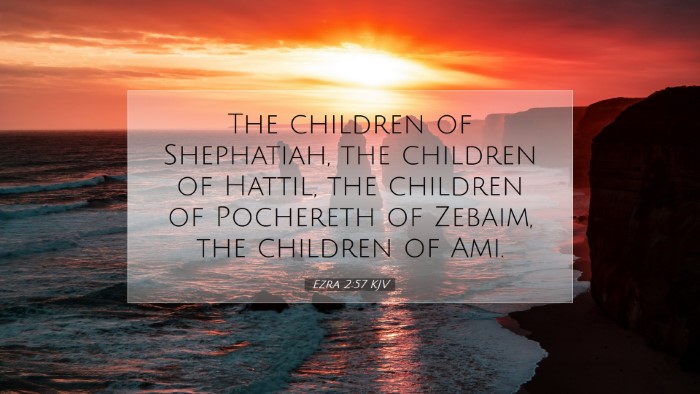Commentary on Ezra 2:57
The verse Ezra 2:57 reads: "The children of Solomon's servants: the children of Sotai, the children of Sophereth, the children of Peruda." This scripture is part of a genealogical record that enumerates those who returned to Jerusalem after the Babylonian exile.
In this commentary, we will explore the significance of this verse as seen through the lenses of public domain commentaries by Matthew Henry, Albert Barnes, and Adam Clarke.
Contextual Background
Ezra is a significant book in the Old Testament as it details the history of the Jewish people returning to their homeland after seventy years of Babylonian captivity. The list of names in this chapter serves to affirm the identity and heritage of those who returned, establishing a connection between the exiles and their ancestral land.
Historical Significance
Each name mentioned in this chapter not only grasps historical context but also spiritual significance. The mention of "the children of Solomon's servants" suggests a lineage that traces back to the time of the great king, Solomon, emphasizing a noble heritage that was involved in service to God’s house.
Insights from Commentators
Matthew Henry
Matthew Henry points out that this list serves as a reminder of God's faithfulness to His promises. He writes that despite their long exile, God’s people were preserved and returned to their homeland. The inclusion of those who served in the temple indicates that even the servants were recognized for their roles in divine worship.
Henry emphasizes the importance of names in Scripture, stating that every name represents a person with a story and a genealogy that connects to God's overarching narrative. Thus, these names symbolize not only their lineage but also their role in God's plan for redemption and restoration.
Albert Barnes
Albert Barnes highlights the notion of service within the context of this verse. He interprets the "children of Solomon's servants" as those who were formerly engaged in the maintenance of the temple and its rituals. Their return signifies a restoration of worship practices that had been lost during the captivity.
Barnes notes that this genetic lineage reminds the readers that service in God's temple transcends status and encompasses all who are willing to follow God's call. Their past roles as servants serve as a testament to the equality found in community worship.
Adam Clarke
Adam Clarke expands on the idea of family and community in his commentary, pointing out that the identification of Solomon's servants implies a collective identity that was retained even in exile. He asserts that the family's work was never forgotten, even amid trials and tribulations.
Clarke also mentions the specific names listed, indicating that they carried the honor of their ancestors and had a divine purpose in returning. The physical return to Jerusalem was not simply about geography; it represented a spiritual restoration as well.
Theological Reflections
This verse invites theological considerations regarding identity, service, and community in the life of faith. It raises vital questions for leaders and believers today regarding heritage, the roles of servants in ministry, and the value God places on each individual in His divine narrative.
Identity in Community
The listing of names is a profound reminder that identity is often tied to community. In ecclesiological terms, this passage prompts reflection on how church communities recognize and honor their members' pasts, even those who may seem to serve in lesser capacities.
God's Faithfulness
The broader theme of God's faithfulness is paramount, especially as exemplified through the return of these descendants of servants. This exemplifies how God is committed to restoring His people through their faithfulness and the fulfillment of His promises.
Conclusion
Ezra 2:57’s mention of Solomon's servants brings a rich vein of insight beneficial to pastors, theologians, students, and all scholars of the Bible. Not only does it speak to the historical reality of the returning exiles, but it also reinforces the ongoing story of redemption where every individual is valued and every act of service honored within the community of faith.


